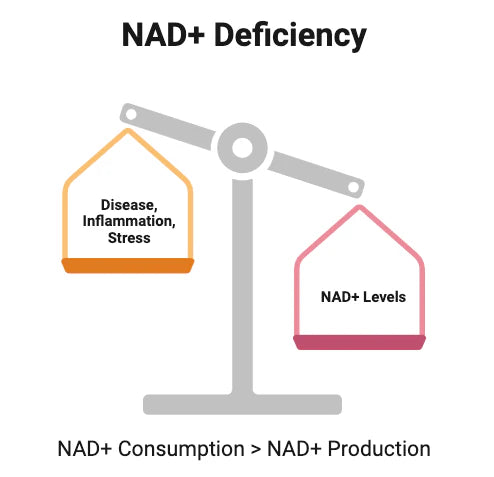NAD+ levels are dynamic, with its overall concentration determined by the balance between its synthesis and breakdown.
Many diseases and biological stressors disrupt NAD+ metabolism and are associated with low levels of NAD+, such as obesity, infection, alcohol consumption, and high blood pressure.
“In 2019, 53.8% of adults aged 18─34 years had at least one chronic condition, and 22.3% had more than one condition.” (1)

Recent research suggests that replenishing NAD+ stores may be a promising therapeutic strategy for these conditions.
Key Points
- NAD+ levels decreased by 44% in patients with high blood pressure
- NR increased NAD+ levels 2-6 fold in young patients with Ataxia Telangiectasia
- Low NAD+ and high CD38 levels are found in several autoimmune diseases
- Alcohol consumption has been linked to low NAD+ levels in the CSF and liver
- Niacin replenished NAD+ levels in patients with a muscle disease
- Overconsumption of fat reduced muscle NAD+ levels in men
- Viral infections reduced muscle NAD+ levels in a study
- Restoring NAD+ levels in Acute Kidney Injury may be beneficial
High Blood Pressure

A clinical trial found that low NAD+ levels in the blood were associated with high blood pressure in adults.
“NAD+ levels were significantly decreased by 44% in PBMCs isolated from hypertensive patients.”
In these subjects, supplementation with NMN in combination with lifestyle modifications for 6 weeks led to greater improvements in blood pressure than participants that only made lifestyle modifications.
Autoimmune Diseases
Gouty arthritis: Analysis of whole blood samples showed Gouty Arthritis patients had significantly lower NAD+ levels and higher levels of the NAD+ consuming enzyme, CD38, compared to healthy controls.
Systemic Lupus Erythematosus (SLE): A study found that SLE patients that were prone to infection had significantly increased levels of the NAD+-consuming enzyme, CD38, and decreased levels of NAD+ in their white blood cells compared to healthy subjects.
Psoriasis: Serum NAD+ levels were found to be significantly lower in study with psoriatic patients when compared to the control group.
Inflammatory Bowel Disease (IBD): Dysregulation of NAD+ metabolism in IBD was reported in a study, with Intestinal tissue biopsies of IBD patients showing changes in 10 proteins involved in NAD metabolism, including the NAD+-consuming enzyme CD38, compared to healthy controls.
Neurological Function

Ataxia Telangiectasia (AT) is a genetic neurodegenerative disease. Animal studies have shown it involves persistent DNA damage, mitochondrial dysfunction, and low NAD+ levels.
A study investigated the effects of NR supplementation in AT patients over two years. The mean age of the AT patients was 13Y 2M and the average blood NAD+ levels were 13.4 μM at baseline. NR supplementation increased blood levels 2-6 fold and the patients showed improved motor coordination and eye movements.
Muscle Function
Mitochondrial Myopathy: A clinical trial showed that NAD+ levels in the blood and muscles of patients with a muscle disease were much lower than healthy individuals. Supplementation with Niacin had significant effects:
- Blood NAD+ levels increased by 7.1-fold (4 months) and 8.2-fold (10 months)
- Muscle NAD+ levels increased by 1.3-fold (4 months) and 2.3-fold (10 months)
Muscular Dystrophy: A study found that muscle samples from people with neuromuscular diseases had higher levels of genes that divert NAD+ precursors away from NAD+ production and lower levels of genes that help make NAD+, compared to healthy muscle samples.
- The researchers also used a mouse model of muscular dystrophy and found that supplementation with NR replenished NAD+ levels and improved muscle function.
Alcohol Consumption

A study found that the levels of NADH in the cerebral spinal fluid (CSF) of individuals who consumed more than one drink of alcohol a day were significantly lower than individuals who did not drink.
An analysis of liver samples from patients with Alcoholic Liver Disease receiving a liver transplant showed significantly lower levels of NAD+ and the NAD+ precursors, nicotinic acid and nicotinamide riboside, compared to healthy liver samples.
In a study using a chronic ethanol mouse model, the injection of NMN (500 mg/kg) every other day for 6 weeks increased liver NAD+ levels, protected 25% of the genes modulated by ethanol, and prevented the rise in plasma markers of liver damage.
High Fat Diet
A clinical trial evaluated the effects of overconsuming fats on metabolism in the skeletal muscle of men. After 56 days on a high fat diet, muscle biopsies showed a significant reduction in NAD+ levels compared to baseline.
Infectious Diseases
Analysis of the skeletal muscle tissue of middle-aged asymptomatic people living with HIV (PLWH) showed significantly reduced levels of total NAD, NAD+, and NADH. Even lower levels were seen in those coinfected with Hepatitis C Virus or Cytomegalovirus.
The infections were also associated with increased inflammation and physiologic frailty.
Kidney Disease

Researchers conducted a series of studies using cardiac surgery cohorts, an ICU cohort, and a healthy volunteer cohort to evaluate metabolic changes in Acute Kidney Injury (AKI). They found NAD metabolism was disrupted in AKI and that increasing NAD+ levels may be a potential therapeutic strategy.
“The results propose that de novo NAD+ biosynthesis becomes impaired during human AKI and that augmentation of NAD+ metabolism may be safe and potentially beneficial.”
Another trial found supplementation with Nicotinamide Riboside and Pterostilbene (NRPT) NRPT was safe and increased whole blood NAD+ levels in hospitalized AKI patients.




